19 min
Everything I learned about achievement came from the front seat of a patrol car, and I want strongly emphasis the words, front seat. I went all the way through school and ran a successful law practice and several successful businesses. However, it was my time as a city police officer that truly taught me how to achieve.
Believe it or not, achieving something is a simple formula. Take a result, react to it, respond to it, arrive at another result, and then evaluate the outcome. That’s achievement. I know that sounds like word salad, but let’s break it down with an example.
Let’s say you’re a technology company that builds something. The result is whether it works or not. Now, let’s assume that your product doesn’t work. As a human, you react to this. Your reaction can range from fear to anger to frustration.
Once you’ve had time to react, you can respond. In our example, your response would be to diagnose the problem, fix the issue, and release the improvement. Now, you have a new result. If the fixes you implemented were effective, the result should be that it works! Then and only then can you evaluate the outcome.
Your company released something that didn’t work, you reacted impulsively, then you gathered yourself and responded. In this case, your response was appropriate and fixed the problem. The updated result was what you were expecting.
In my opinion, how long you spend in the reaction stage dictates the outcome. If you linger in the reaction stage for too long, the outcome is probably not good, even though the second result was what you had hoped for. However, if you move through the reaction stage appropriately and begin to respond to the problem, your outcome is probably good.
Once you start stacking positive outcomes, that’s when you start achieving.
So, let’s talk about how my police car experience impacted my enlightenment. You might not be surprised that police radios broadcast crazy stuff, but you might, however, be surprised to learn that a negative outcome can lead to a positive one. Let’s use a simple, PG-13 police example. Imagine you’re a police officer dispatched to a car theft. The outcome is bad—someone’s car was stolen. Your reaction could be frustration, anger, dismay, or disbelief. That reaction, however, is just getting in the way. You need to respond intellectually. That might mean asking the dispatcher for a description of the car and perpetrator, directions of travel, or any other pertinent information you can gather before arriving at the scene. Once there, you ask the right questions, broadcast the information, and write a comprehensive report. Your department and surrounding departments conduct a proper investigation, and either you get the bad guy or you don’t. Obviously, the former is a good result, but the latter is a bad result. However, that result isn’t the outcome. The outcome, regardless of whether you make an arrest or not, is a good one. You conducted a proper investigation, gave everyone a chance to make an apprehension, and whether that investigation resulted in an arrest or not, the outcome was a good one. Now, when you start stacking positive outcomes on top of each other, you can find achievement.
It’s evident from the provided examples that the reaction stage serves as the obstacle to achieving success. The most effective advice I received on overcoming this hurdle is to talk to myself significantly more frequently than I listen to myself. While this may appear as another instance of word salad, it holds true. The self-talk you engage in is the active work of your conscious mind, while self-listening involves the subconscious mind. Until you program your subconscious mind to react appropriately, it’s crucial to maintain the engagement of your conscious mind.
In my police example, when I receive a car theft call, I’ll react. As a human, I can’t help but react. However, the key is to minimize the time I spend reacting. This can only be achieved through self-talk. If you listen, you’ll likely hear frustration, anger, and disbelief—noise you don’t need to hear. Instead, immediately start talking to yourself and identifying the problem and how to respond. This significantly reduces your reaction time and puts you on the path to Result #2.
So, why am I writing a blog like this for my software company’s website? Well, it’s because our company is led by someone who, in my opinion, engages in self-talk more effectively than anyone I’ve ever encountered. When we hit a technology stumbling block, our Chief Technology Officer, Luis Garcia, talks it out. On a conference call. Out loud. To all of us. Sometimes what he says makes sense. Sometimes, by his own admission, it does not, but whatever the case is, I know Luis will talk himself to the answer. Coincidentally, regardless of the circumstances surrounding him, Luis maintains his composure. In other words, he’s as “cool as the other side of the pillow”, a description made famous by the renowned ESPN sports commentator Stuart Scott.
Luis never experiences the panic that sets in during the reaction stage, which is fortunate for all of us and the entire team. Despite some initial negative results, our subsequent results have been consistently positive, leading to tremendous outcomes and achievements beyond our wildest expectations.
I am eagerly expecting the continued remarkable achievements that that lie ahead of us over the coming years. This is because we at clubcloud understand the formula for achievement. I suppose now you do, too.


min






